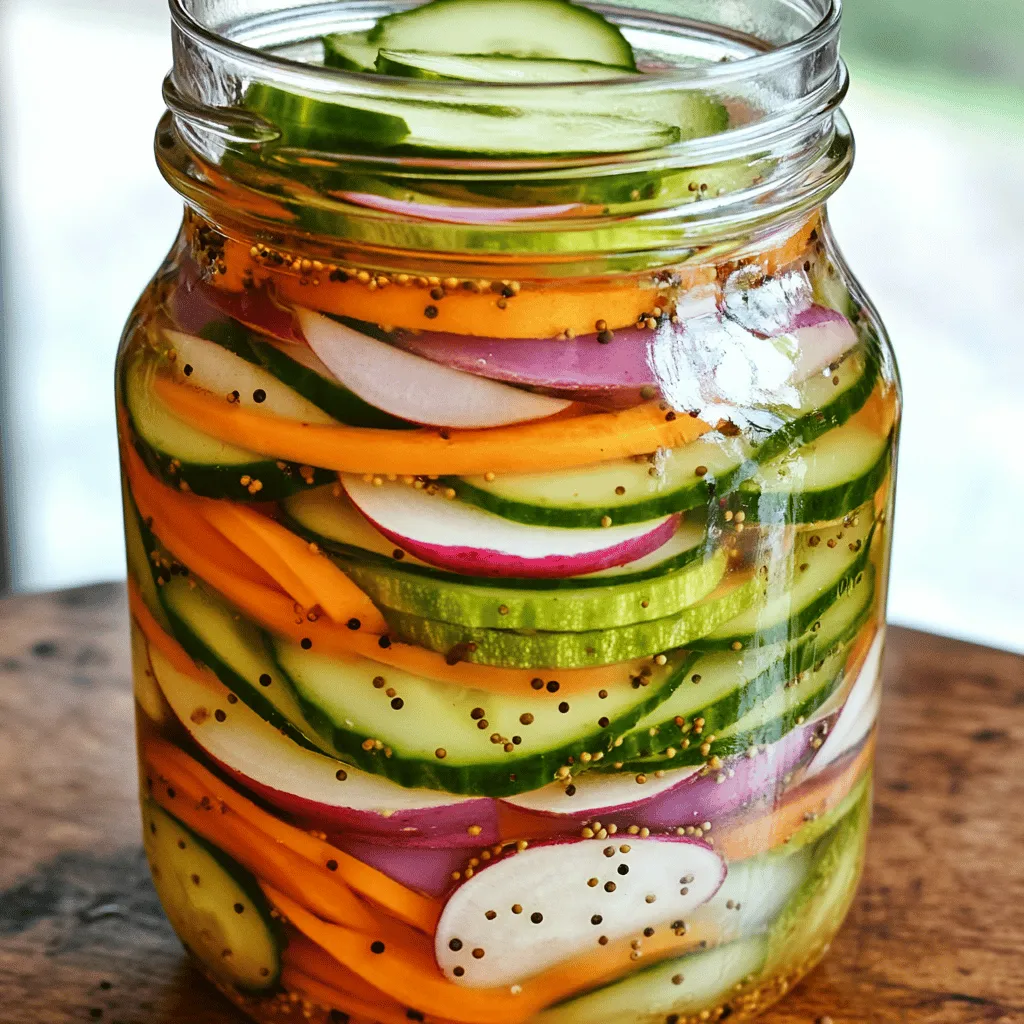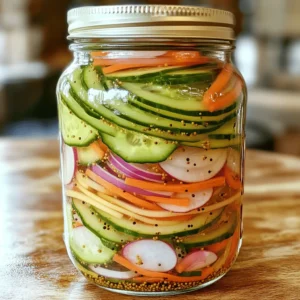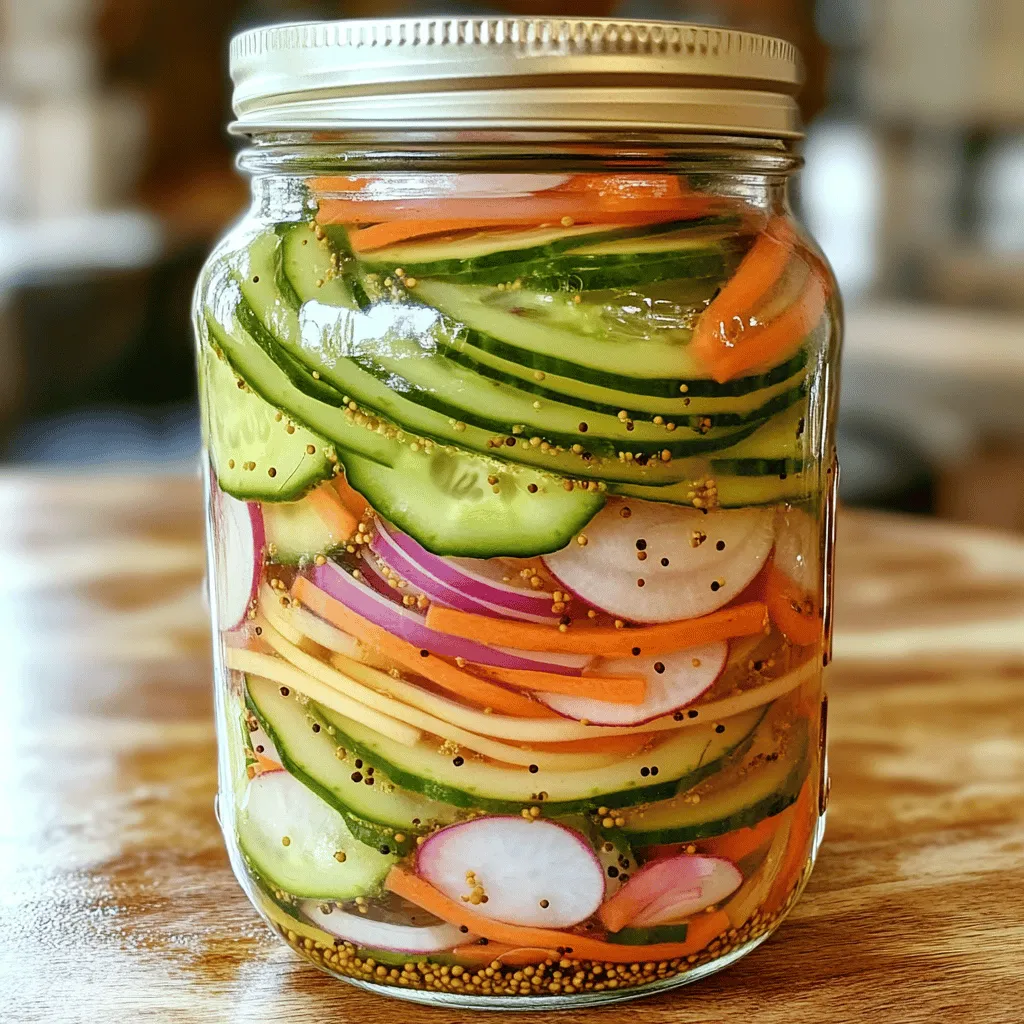Are you ready to transform your favorite veggies into a crispy, tangy delight? In this blog post, I’ll show you how to make quick pickled vegetables that burst with flavor and are easy to prepare. With just a few fresh ingredients and simple steps, you’ll learn how to create a vibrant jar of pickles perfect for snacks or adding to meals. Let’s get started on this delicious journey!
Ingredients
Required Vegetables
– Cucumbers
– Carrots
– Radishes
– Red Onion
For quick pickled vegetables, you need fresh, crisp veggies. I love using cucumbers because they stay crunchy. Carrots add a nice sweetness. Radishes bring a peppery kick, while red onion adds color and sharpness. You can mix and match based on what you have.
Pickling Liquid Components
– Apple Cider Vinegar
– Water
– Sugar
– Salt
The pickling liquid is key to the flavor. Apple cider vinegar gives a nice tang. You mix it with water to balance the acidity. Sugar adds a hint of sweetness, and salt enhances the taste. This blend makes the vegetables pop!
Optional Seasonings
– Black Peppercorns
– Mustard Seeds
– Red Pepper Flakes
Seasonings can elevate your pickles. Black peppercorns add warmth, while mustard seeds bring a subtle crunch. If you like heat, add red pepper flakes. These extras give your pickled veggies a unique twist. For the full recipe, check out my detailed guide!
Step-by-Step Instructions
Preparing the Pickling Liquid
To make the pickling liquid, start by gathering your ingredients. In a medium saucepan, combine:
– 1 cup apple cider vinegar
– 1 cup water
– 2 tablespoons sugar
– 1 tablespoon salt
– 1 teaspoon black peppercorns
– 1 teaspoon mustard seeds
– 1 teaspoon red pepper flakes (optional)
Heat the mixture over medium heat. Stir until the sugar and salt dissolve completely. This step is key for a balanced flavor. Once dissolved, remove the pan from heat and let it cool for about 5 minutes.
Layering the Vegetables
Now it’s time to layer your vegetables. Take a large glass jar or bowl and start arranging the sliced cucumbers, julienned carrots, sliced radishes, and thinly sliced red onion.
– For a colorful presentation, alternate the layers.
– You can start with cucumbers, then carrots, followed by radishes, and finish with red onions.
This not only looks nice but also helps the flavors mix well.
Pickling Process
After layering your vegetables, pour the cooled pickling liquid over them. Make sure all the veggies are fully submerged. This is important for even pickling.
Next, seal the jar or cover the bowl. You have two options for the pickling time:
– Let it sit at room temperature for at least 30 minutes for a quick pickle.
– If you want a deeper flavor, refrigerate for a few hours or even overnight.
You can find the full recipe for more details. Enjoy your crispy, flavorful quick pickled vegetables!
Tips & Tricks
Achieving the Best Flavor
To get the best flavor from your quick pickled vegetables, use fresh ingredients. Fresh cucumbers, carrots, radishes, and onions make a big difference. They add crunch and bright taste.
Next, adjust the seasoning to fit your taste. You can add more sugar for sweetness or salt for extra flavor. Taste the pickling liquid before you pour it over the veggies. Make it just how you like it.
Quick Pickling Tips
The maximum time to soak for the best results is about 30 minutes. This gives the veggies a nice tangy flavor without losing their crunch. For deeper flavor, let them sit in the fridge for a few hours.
I love serving these quick pickled veggies as a snack, condiment, or side dish. They add a pop of color and flavor to any meal. You can also toss them in salads or sandwiches for a zesty kick.
Equipment Suggestions
Choose the right jars for pickling. Glass jars work best because they are non-reactive. You can use pint-sized or quart-sized jars based on how much you make.
For tools, a small saucepan is great for heating your pickling liquid. A funnel helps pour the liquid into jars without a mess. Using a sharp knife for slicing makes prep quick and easy.
For the full recipe, check out the Quick Pickled Vegetables section.

Variations
Vegetable Combinations
You can get creative with your quick pickled vegetables. Start with the basics, like cucumbers, carrots, radishes, and red onion. But why stop there?
– Adding different vegetables: Try bell peppers, zucchini, or even snap peas. Each vegetable brings a unique taste and crunch.
– Seasonal ingredient swaps: Use what’s fresh and in season. In summer, add cherry tomatoes. In fall, try cauliflower or beets. The options are endless!
Flavor Enhancements
Flavors can change the whole dish. Quick pickles are easy to customize.
– Experimenting with herbs and spices: Add fresh dill, thyme, or even cilantro. These herbs can bring bright flavors. Spice lovers might enjoy garlic, ginger, or turmeric for extra kick.
– Sweetness adjustments: If you like it sweet, increase the sugar. For a tangier taste, cut back. Find what suits your palate best!
International Twist Recipes
Give your quick pickles a global flair.
– Asian-style pickled vegetables: Use rice vinegar, sesame oil, and soy sauce. This mix works well with cucumbers and carrots. It adds a savory, umami flavor.
– Mediterranean-inspired variations: Try olive oil, lemon juice, and oregano. This combination pairs nicely with bell peppers and olives. It brings a fresh, vibrant taste that’s perfect for summer meals.
These variations make quick pickled vegetables fun and exciting. You can mix and match until you find your perfect blend! For the complete recipe, check out the Full Recipe section.
Storage Info
Proper Storage Techniques
To keep your quick pickled vegetables fresh, use glass jars with tight lids. Mason jars work well. They are safe and won’t react with the vinegar. Store them in the fridge. A cool, dark place helps keep the pickles crisp. Avoid direct sunlight, as it can affect the flavor and color.
Shelf Life of Quick Pickles
Quick pickles last about two weeks in the fridge. Always check them before using. If they smell off or look cloudy, toss them. A slimy texture is also a sign of spoilage. For the best taste, enjoy them sooner rather than later.
Reusing Pickling Liquid
You can reuse the pickling liquid for more veggies. Just strain it and bring it to a boil again. This will refresh the flavors. Use it within a week for the best results. You can also add new vegetables to the same liquid. Try using it in salad dressings or marinades for added flavor.
FAQs
How long does it take to pickle vegetables quickly?
Quick pickling takes just 30 minutes for a basic flavor. If you let them sit longer, like a few hours, they will taste even better. The longer they sit, the more the flavors blend and deepen. For best results, try to wait at least an hour before diving in.
Can I use distilled vinegar instead of apple cider vinegar?
Yes, you can use distilled vinegar instead. It has a sharper taste. Apple cider vinegar adds a mild sweetness and fruity note. If you want a different flavor, try rice vinegar or white wine vinegar. Each type gives your pickles a unique twist.
What are some of the best vegetables for quick pickling?
For quick pickling, I love using:
– Cucumbers
– Carrots
– Radishes
– Red onions
These veggies have great crunch and flavor. You can also try bell peppers, green beans, or even cauliflower. Feel free to mix and match based on your taste. Remember, the key is to choose fresh, crisp vegetables for the best results.
Quick pickling is simple and fun. You learned about crucial vegetables like cucumbers and carrots. The right pickling liquid, using apple cider vinegar, makes a big difference. Layering your veggies creates a beautiful jar. Don’t forget the optional seasonings for extra flavor!
With fresh ingredients and the right care, your pickles will taste great. Remember to experiment with combinations and flavors, and know how to store them. Enjoy your pickling journey—I know you’ll love the results!

